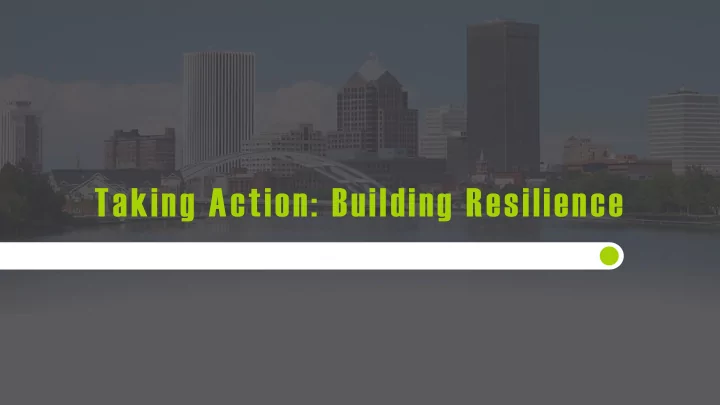

Taking Action: Building Resilience
The Greater Rochester Initiative for Children’s Social and Emotional Health
The Greater Rochester Initiative for Children’s Social and Emotional Health
The Greater Rochester Initiative for Children’s Social and Emotional Health Mission Challenge the status quo and inspire action that will significantly improve the social and emotional health of children throughout the Greater Rochester Region.
Learning and Action Agenda • Why Are We Here Today? • Defining Terms – Trauma – Adverse Childhood Experiences (ACEs) – Toxic Stress – Trauma Informed Care • The Prevalence of ACEs • The Impact of ACEs on Health and Development • Resilience • The Importance of Organizational Response • Taking Action: Building Resilience
Why We Are Here Today School Attendance Teen Drug Use Pregnancy
Why We Are Here Today School Low Grades Malnutrition Attendance At-Risk Teen Drug Use Behaviors Pregnancy
Why We Are Here Today School Low Grades Malnutrition Attendance At-Risk Mental Health Behaviors Issues
Why We Are Here Today School Academic Malnutrition Attendance Performance At-Risk Teen Mental Health Behaviors Pregnancy Issues
Why We Are Here Today School Academic Graduation Attendance Performance Rates At-Risk Teen Mental Health Behaviors Pregnancy Issues
Why We Are Here Today School Academic Graduation Attendance Performance Rates At-Risk Teen Mental Health Behaviors Pregnancy Issues
Why We Are Here Today TRAUMA
Why We Are Here Today “Reducing the effects of significant adversity on children’s healthy development is essential to the progress and prosperity of any society” Center on the Developing Child, Harvard University
Defining Terms
Trauma “Individual trauma results from an event , series of events, or set of circumstances that is experienced by an individual as physically or emotionally harmful or life threatening and that has lasting adverse effects on the individual’s functioning and mental, physical, social, emotional, or spiritual well- being” SAMHSA
Trauma Informed Care Approach “Trauma - informed care has emerged as a ‘strengths -based framework grounded in an understanding of and responsiveness to the impact of trauma’ (Hopper at al., 2010). Trauma -informed care is promoted when organizations and providers integrate a knowledge and understanding of trauma into their everyday practices to strengthen capacity to respond to the needs of trauma survivors.” Thinkt3
Trauma And ACEs Adverse Childhood Experiences
Trauma And ACEs Examples of Additional Types of Trauma • Bullying (by another child or adult) • Witness of a brother or sister being abused • Racism, sexism, or other forms of discrimination • Community violence - neighborhood violence/safety • Lack of nutritious food • Homelessness • Natural disasters and war
What is the Prevalence of ACEs?
ACEs – How Prevalent Are They? Monroe County YRBS 2015 Percentage of participants that experienced a specific ACE Office of Mental Health & Dept. of Public Health Source: ACE Study; www.cdc.gov/ace/prevelance.htm
ACEs In Our Community Monroe County Monroe County YRBS 2015 Office of Mental Health & Dept. of Public Health
Impact Of ACEs On Health And Development Youth Risk Behaviors
The Impact of ACEs on Health and Development
Toxic Stress
Impact Of ACEs On Health And Development
Impact Of ACEs On Health And Development Trauma Changes The Brain • Prefrontal Cortex shuts down – Poor concentration – Difficulty paying attention – Inability to think clearly • Limbic System shuts down – Difficulty managing emotions – Hard time letting go of minor annoyances • Amygadala strengthens – Fight, Flight, Freeze response
Impact Of ACEs On Health And Development Trauma Changes The Body • • • Obesity High blood pressure Premature aging • • • Coronary artery disease Panic attacks Worsening of infertility • • Nightmares/insomnia Increased drug use
The Importance of Organizational Response
Impact Of ACEs Is Costly
Unique Opportunity For Organizational Impact
Key Principles OF Trauma Informed Care Approach
Resilience
Committing to Action
Commit To Action
Trauma Response Actions For Organizations
What is Your Next Step? The impact of trauma is real. We can make a difference together. Raising Resilience Finger Lakes ACEs Summit Connection Spring 2018 Forum Website January 9 th , 2018
Contact Us For more information contact Anita Black at the Greater Rochester Health Foundation ablack@thegrhf.org
Questions?
Thank you
Recommend
More recommend